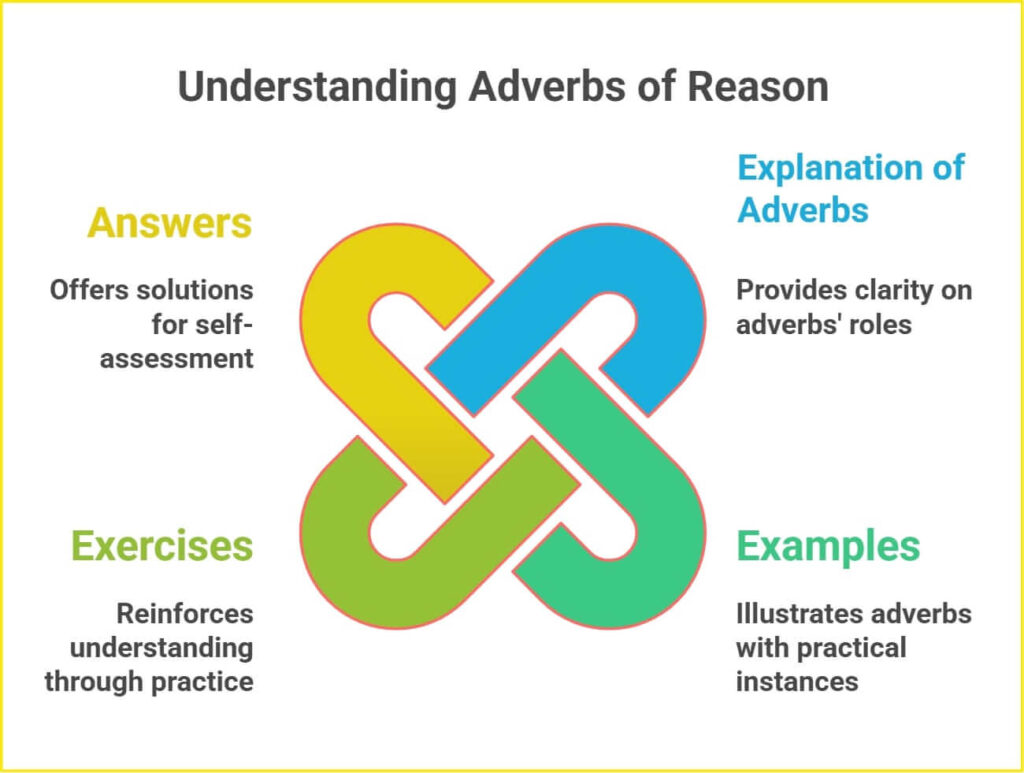Have you ever wondered why certain things happen in a sentence? Just like we explain our actions to friends, adverbs of reason help us tell the “why” behind our words. Every day, we use these important words to explain our choices, like saying I brought an umbrella because it might rain or I studied hard so that I could pass the test.
In this guide, we’ll explore Adverbs of Reason with Examples in detail. You’ll learn their definition, usage, types, rules, common examples, exercises, FAQs, and practice activities to help you master them.
Contents
ToggleWhat is an Adverb of Reason?
An adverb of reason is like a bridge that connects our actions with their purposes. These special words explain why something happens.
Examples:
- “I’m wearing a coat because it’s cold.”
- “Since it’s sunny, let’s go to the park.”
Here, words like because and since are adverbs of reason. They tell us the cause behind the action, making communication clearer and more meaningful.
Meaning of Adverbs of Reason with Examples
Adverbs of reason guide readers and listeners through ideas, just like traffic lights guide cars. They connect actions with reasons, helping us explain choices.
The most common adverbs of reason include because, therefore, since, so that, and consequently.
Examples:
- “I finished my homework early because I wanted to play basketball.”
- “The bus was late, therefore we took a taxi.”
- “Since it was snowing, we had hot chocolate.”
- “We water the plants daily so that they grow strong.”
- “I forgot my wallet, consequently I shared lunch with my friend.”
Common Adverbs of Reason
- Because – shows cause
- Since – explains a reason
- Therefore – connects cause and effect
- So that – expresses purpose
- Consequently – shows a result
Adverbs of Reason with Examples – Quick Rules Table
| Adverb of Reason | Function / Usage | Example Sentence |
|---|---|---|
| Because | Shows the cause of an action | I stayed inside because it was raining. |
| Since | Explains a reason | She was smiling since she got good news. |
| Therefore | Connects cause and effect | He was tired, therefore he went to bed early. |
| So that | Expresses purpose | I left early so that I could catch the bus. |
| Consequently | Indicates a result | He lost his wallet, consequently he borrowed money. |
20 Sentences of Adverbs of Reason with Examples
- I stayed home because it was raining heavily.
- She left early since she had an appointment.
- He studied hard, therefore he passed the exam.
- They practiced daily so that they could win the match.
- I couldn’t attend the party because I was feeling sick.
- The train was delayed, consequently we missed the meeting.
- She smiled since she was happy with the results.
- The baby cried because he was hungry.
- He speaks softly, therefore everyone listens carefully.
- I bought a gift so that I could surprise my friend.
- We stayed indoors because it was too cold outside.
- She skipped lunch, consequently she felt weak.
- The students paid attention since the teacher explained clearly.
- He didn’t sleep well, therefore he looked tired.
- I switched on the light because it was dark.
- She practices daily so that she becomes a better dancer.
- They stayed calm since they trusted their leader.
- The roads were blocked, therefore we took another route.
- He apologized because he realized his mistake.
- We work hard so that we can achieve our goals.
Exercises on Adverbs of Reason with Examples
Exercise 1: Fill in the Blanks
Choose the correct adverb of reason: because, therefore, since, so that.
- I brought my umbrella ___ it might rain.
- The bus was late, ___ we took a taxi.
- ___ you helped me, I’ll help you too.
- We left early ___ we wouldn’t miss the show.
Answers: 1) because 2) therefore 3) since 4) so that
Exercise 2: Matching Game
Match the halves:
A. Since it was cold… → I wore my warm coat
B. The stove broke… → therefore we ordered pizza
C. I studied hard… → so that I could pass the test
D. It was raining… → because we love playing in puddles
Exercise 3: Spot and Fix Errors
- I went to bed early because so I could wake up early.
- Therefore it was cold, we stayed inside.
- We bought tickets so therefore we could see the movie.
Corrected:
- I went to bed early so that I could wake up early.
- Since it was cold, we stayed inside.
- We bought tickets so that we could see the movie.
FAQs on Adverbs of Reason with Examples
1. What exactly are adverbs of reason?
They are words like because, since, therefore, so that, and consequently that explain why something happens.
2. How do adverbs of reason improve writing?
They create clear connections between ideas, making communication logical and easy to follow.
3. What are the most common adverbs of reason?
Because, since, therefore, so that, consequently.
4. Can students use adverbs of reason in academic writing?
Yes! They strengthen arguments by linking evidence and conclusions clearly.
5. Why are adverbs of reason important?
They act like bridges in sentences, showing cause-and-effect relationships for better communication.
Conclusion
Using adverbs of reason with examples will make your communication clearer, more logical, and more effective. Whether in daily conversations, essays, or academic writing, these words connect ideas smoothly and help you explain the “why” behind your actions.
Practice them with the exercises above, revisit the examples often, and soon adverbs of reason will become a natural part of your English grammar skills.


